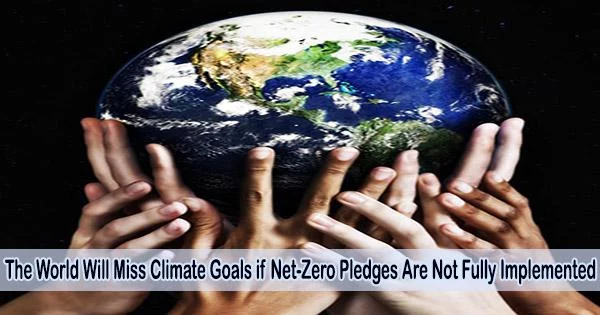Without more comprehensive, legally-binding net-zero measures, the world is quite likely to fall short of important climate goals.
Researchers found that there is little trust in the complete execution of 90% of the worldwide promises to achieve net-zero greenhouse gas emissions, according to the new analysis, which was headed by Imperial College London and published today in Science.
To maximize the chance of avoiding the worst effects of climate change, the researchers advise nations to make their aims legally enforceable and support them with both long-term plans and short-term execution programs.
Lead researcher Professor Joeri Rogelj, director of research for the Grantham Institute at Imperial, said: “Climate policy is moving from setting ambitious targets to implementing them. However, our analysis shows most countries do not provide high confidence that they will deliver on their commitments. The world is still on a high-risk climate track, and we are far from delivering a safe climate future.”
Assigning confidence
The Paris Agreement’s climate targets include maintaining temperature increases well below 2°C and, preferably, below 1.5°C above the average temperature before the industrial revolution. The major strategy for accomplishing this is to quickly attain “net-zero” greenhouse gas emissions, where any remaining emissions are successfully offset.
Climate change targets are by their nature ambitious there’s no point in setting a target for a foregone conclusion. But implementation must follow.
Taryn Fransen
Most countries have set net-zero goals and Nationally Determined Contributions (NDCs) non-binding national plans proposing climate actions. The world has a possibility of limiting global warming to 1.5–2 degrees Celsius if these policies are taken at their value and properly implemented.
However, if just present policies are used and net-zero commitments are not carried out, models project temperature increases of up to 2.5–3 degrees Celsius by 2100, with warming continuing to grow.
To reduce the uncertainty in which of these scenarios is likely to happen, the team, including researchers from the UK, Austria, USA, Netherlands, Germany, and Brazil, assigned a ‘confidence’ to each net-zero policy. They assessed 35 net zero targets, covering every country with more than 0.1% of current global greenhouse gas emissions.
The rating of confidence was based on three policy characteristics: whether the policy was legally binding, whether a reliable policy plan was used to implement it, and whether short-term plans would already have emissions on a downward trajectory over the next ten years.
Consequently, policies were assigned a “higher,” “lower,” or “much lower” confidence in their ability to be completely implemented. Some regions scored highly, including the European Union, the United Kingdom and New Zealand, but around 90% scored ‘lower’ or ‘much lower’ confidence, including China and the US, which together account for more than 35% of current emissions.
Modelling emissions
The researchers created five models of projected greenhouse gas emissions and temperature changes based on this assessment. These were: considering only current policies (the most conservative scenario); only adding in policies that have a high confidence of being implemented; adding policies with high and low confidence; adding all policies regardless of confidence as if they are implemented; and a scenario where all policies are fully implemented and all NDCs are met (the most forgiving scenario).
The most conservative scenario had the largest uncertainty, with a range of 1.7-3°C and a median estimate of 2.6°C. The most optimistic scenario has a range of 1.6-2.1, with a median estimate of 1.7°C.
This might imply that the Paris Agreement targets can be achieved if all net-zero policies are completely implemented. This would, however, be wishful thinking in the absence of additional efforts given that so many policies are rated at the low end of the confidence scale.
Co-author Taryn Fransen, from the World Resources Institute in Washington DC, and the Energy and Resources Group at the University of California-Berkeley, said: “Climate change targets are by their nature ambitious there’s no point in setting a target for a foregone conclusion. But implementation must follow.”
Catalysing action
According to the researchers, raising the number of net zero policies that are legally obligatory from the current twelve to 35 will help assure the policies’ long-term viability and spur action. Additionally, countries require precise implementation pathways for various sectors, describing the adjustments that must be made and who is responsible for them.
Co-author Dr. Robin Lamboll, from the Centre for Environmental Policy at Imperial, said: “Making targets legally binding is crucial to ensure long-term plans are adopted. We need to see concrete legislation in order to trust that action will follow from promises.”
















